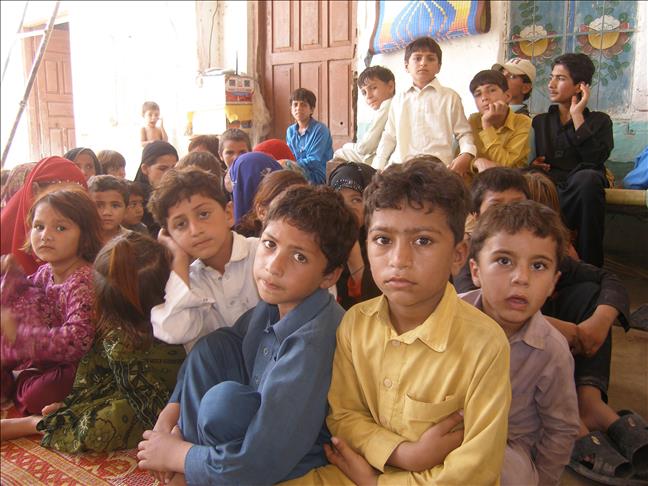
By Aamir Latif
BANNU, Pakistan
Gulzar Ali, 14, is one of thousands of children who have been absent from their schools for the past four months in the wake of a large-scale military onslaught on the restless North Waziristan tribal region, which has been dubbed by the U.S. as a heartland of militancy.
The military operation seeks to eradicate Tehrik-e-Taliban Pakistan, a conglomerate of different insurgent groups in Pakistan, also known as the Pakistani Taliban.
The much demanded operation, launched on June 15, has forced nearly a million people to take refuge in the nearby district of Bannu, over 250,000 of which, according to figures issued by the National Disaster Management Authority, are children.
Of these 250,000 children, over 87,000 used to regularly attend school.
Though the army claims to have killed over 1,300 suspected militants in air strikes and clashes over the past four months, the displaced Waziris do not see any immediate prospect of return.
“I truly miss my school,” Ali, an eighth grade student, told the Anadolu Agency.
The eighth grade student migrated from Mir Ali, the second largest town in North Waziristan and the epicenter of clashes between the Pakistani Taliban and army troops.
The nearest secondary school is six kilometers away from where Ali and his family are now forced to lodge -- a small rented house in Domail, a suburban area of Bannu.
“I want to go back to my school because I have been doing nothing here except wandering all day long,” Ali complained.
Many of North Waziristan's students have been admitted to local government and private schools in Bannu and the surrounding districts, but thousands are still out of school due to financial problems.
This is in addition to the wider problem that Bannu is only a small city, and its existing schools cannot cope with thousands of additional students.
Therefore, those who could afford it have moved to Peshawar for their children’s education, but these families remain a minority.
Furthermore, in Bannu’s suburban areas, several government schools are being used by internally displaced persons -- forcing the administration to shift the local students to other schools for the time being.
However, the state education minister, Atif Khan, claims that the schools currently occupied by these internal refugees were already dysfunctional.
“So far, some 15,000 students from North Waziristan have been enrolled in different schools in Bannu. We do not have figures about other districts,” Khan told the Anadolu Agency.
The minister did not have figures about university students either, who have also been missing their classes for the past four months.
The administration in charge of the northwestern Khyber Pakhtunkhawa province has already announced that displaced students will be granted admission to local schools without any documents, as a bulk of them were unable to even bring their books with them during their migration.
But displaced students contest the government’s claim.
“I have been running from here to there for the last three months for admission to the local Bannu university, but the administration has refused to grant me admission for reasons better known to them,” Mati ur Rehman, an eleventh grade student, told the Anadolu Agency.
Currently lodged in the suburbs of Bannu, Mati, 17, who has four other siblings, said he could not afford applying to a private college due to the heavy fees they charge.
His four brothers have also been sitting at home for the past four months. “We are hardly coping with food and housing expenses, how can my parents also afford our educational expenses?” Mati asked.
Soft targets
Tribal elders have demanded the government let those who were internally displaced go back to areas that have been cleared of militants.
“We demand this because our lands and businesses are there. But more than that, we want this for our children's education,” Malik Mohammad Iqbal, a tribal elder hailing from Miranshah, North Waziristan, explained.
“They are wasting their time and energies here, which could be exploited by militants,” Iqbal warned.
The tribal elder feared that wandering children could be a soft target for militants who have already misguided and converted numerous children into suicide bombers.
Professor Iqbal Afridi, a Karachi-based psychologist, endorses Iqbal’s apprehensions.
“If these children are not guided into a positive direction, they may turn out to be anti-social elements,” Afridi observed.
"If they sit idle at home, they may fall prey to anger and aggression, which could lead them into the hands of terrorists; or anxiety and depression, which could plunge them into the world of drugs and crime,” he added.
Refugee camps in Pakistan have served as a breeding ground for the Afghan Taliban in the recent past, according to Pakistani intelligence agencies.
Hundreds of fighters have previously been recruited from such camps by the Taliban to fight alongside them in Afghanistan.
Anadolu Agency website contains only a portion of the news stories offered to subscribers in the AA News Broadcasting System (HAS), and in summarized form. Please contact us for subscription options.

